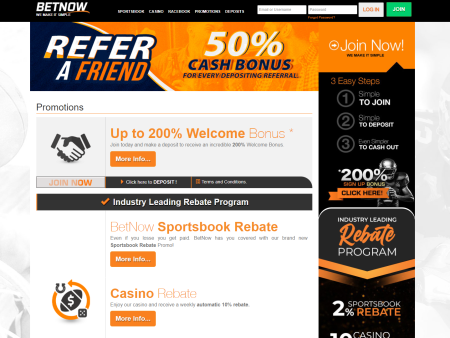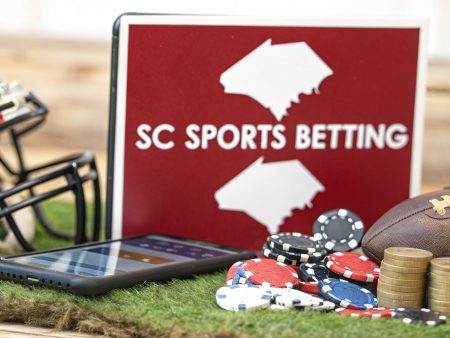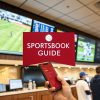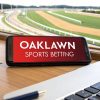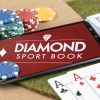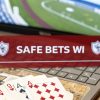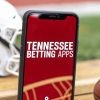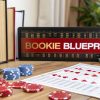Forget what you think you know about sports betting. Making real, consistent money isn't about having a "lucky" feeling or just picking the teams you think will win. It’s a complete mindset shift—you have to start thinking like a calculated investor, not a casual fan.
Success boils down to one core concept: consistently finding and exploiting value. That means betting on odds that are better than the actual probability of that outcome happening.
Building Your Foundation for Profitable Betting
Making the leap from a recreational bettor to someone who can turn a consistent profit is a huge step. It all starts with understanding the one massive hurdle standing in your way: the sportsbook's built-in advantage. This isn't some dirty secret; it's the very foundation of their business.
Take a look at the odds on any major sportsbook like Bovada, MyBookie, or BetUS. You’ll almost never see a perfectly balanced matchup priced at +100 for both sides. Instead, you'll see -110. That extra bit is the sportsbook's commission, what we call the vigorish or "vig." It’s the fee you pay for the privilege of placing a bet.
The Math That Works Against You
This small fee has a massive impact. Because of the vig, you have to win more often than you lose just to break even. It’s a constant uphill battle.
To be precise, you need to win 52.4% of your bets against the spread just to overcome that commission and see a profit. That's why simply "picking winners" at a 50/50 clip is a losing strategy over the long haul. Your bankroll will slowly bleed out. The only way to win this game is to adopt a structured, mathematical approach.
The Cornerstone: Bankroll Management
Your bankroll is the money you've specifically set aside for betting. This is critical: it must be money you can afford to lose, completely separate from your daily living expenses. Treat it like investment capital, because that's what it is.
The golden rule here is to never, ever risk a huge chunk of your bankroll on a single bet. This is where the concept of a "unit" becomes your best friend.
A betting unit is simply a set percentage of your total bankroll, usually somewhere between 1% and 3%. This standardizes your bet size, preventing a bad losing streak from wiping you out and stopping your emotions from dictating how much you wager.
For instance, if you have a $1,000 bankroll, a 1% unit is $10. A 2% unit is $20. Every single bet you place should be based on this unit size. Even on your most confident plays, you should rarely risk more than 3-4 units. This structured approach provides the stability you need to ride out the inevitable ups and downs of betting.
The image below shows the simple, repeatable cycle required to manage your betting capital and aim for sustainable growth.
This process isn't just a suggestion; it's a necessity. A solid bankroll strategy protects you from going bust and, just as importantly, takes emotional decision-making out of the picture. It forces you to think and act like a pro. To really get this down, you should check out our detailed guide on sports betting bankroll management. Mastering this discipline is what separates the pros from the perpetual amateurs.
Core Principles for Profitable Betting
To succeed, you need to internalize a few key ideas. These aren't just tips; they are the fundamental principles that winning bettors live by. Think of this as your cheat sheet for shifting from a gambler to a sharp.
| Principle | Why It's Critical | Actionable Tip |
|---|---|---|
| Find Positive EV (+EV) | This is the only way to beat the bookie long-term. You must find bets where the odds offered are better than the true probability. | Learn to create your own odds or use reliable models to compare against sportsbook lines. If you think a team has a 60% chance to win but the odds imply 50%, that's a +EV bet. |
| Strict Bankroll Management | It protects you from ruin during losing streaks and removes emotion from your wager sizing, ensuring sustainability. | Define your bankroll, stick to a 1-3% unit size, and never chase your losses by increasing your bet size impulsively. |
| Line Shopping | Different sportsbooks offer different odds on the same game. Not finding the best line is like giving away free money. | Have accounts at multiple sportsbooks (BetUS, Sportsbetting.ag, Xbet, MyBookie, Bovada) and always compare odds before placing a wager. A half-point difference can be the margin between winning and losing. |
| Emotional Discipline | Emotional highs and lows lead to poor decisions, like chasing losses or betting too much after a big win ("overconfidence"). | Treat every bet as an independent event. Stick to your strategy regardless of recent results. Never bet on your favorite team unless the numbers support it. |
Mastering these four principles is non-negotiable. They form the bedrock of any successful betting strategy, providing the structure and discipline required to navigate the markets profitably.
How to Find True Value in Betting Markets
If you really want to learn how to make money betting on sports, you have to make one critical shift in your mindset: stop picking winners and start hunting for value. This is the single biggest thing that separates professional bettors from the 99% who just feed their money to sportsbooks like MyBookie, BetAnything, and Bovada.
The goal isn't just to be right. It's to be right when the price is wrong.
At its heart, a value bet is simple. It's a wager where the odds you're getting from the book are better than the actual, real-world probability of that outcome. Think of it like buying a stock for less than it's truly worth. To spot these opportunities, you first have to speak the language of odds.
Uncovering Implied Probability
Every set of odds has an "implied probability" baked right into it. This is the chance of something happening according to the sportsbook. Getting a feel for this is non-negotiable if you want to find value. The first step is learning how to turn American moneyline odds into a simple percentage.
Let's walk through a real-world example. Say the Green Bay Packers are playing the Chicago Bears, and an offshore book like BetUS has the Packers listed at +150.
To figure out the implied probability for positive moneyline odds (+), the formula is straightforward:
- 100 / (Moneyline Odds + 100)
For the Packers, that’s 100 / (150 + 100) = 0.40, or 40%. The sportsbook's odds are telling you they think the Packers have a 40% shot at winning. This number is now your baseline.
Now, your job is to figure out if the Packers' actual chance of winning is higher than that 40%. After you do your own homework—looking at injuries, coaching tendencies, and recent form—you might decide they actually have a 45% chance to win. Boom. You've just found value. That 5% gap between your number and the book's number is your edge.
Key Takeaway: Profitable betting isn't about having a crystal ball. It’s about consistently finding spots where the market's price (the odds) doesn't line up with the true probability of an event.
Finding an Edge in Niche Markets
Let's be honest, finding an edge on major markets like NFL point spreads is incredibly tough. The lines at top-tier books like Sportsbetting.ag and Xbet are razor-sharp, refined by millions of dollars in bets and some seriously sophisticated algorithms.
This is exactly why so many pros focus their energy on less popular, or "niche," markets. The simple truth is that oddsmakers at sites like Bovada don't have the time or resources to set perfectly efficient lines on every single thing you can bet on.
Here are a few less-traveled roads where value often hides:
- Player Props: Betting on how one player will perform (passing yards, total bases, etc.) is a goldmine. A bookmaker might not fully account for a specific defensive matchup or how a player's role has changed in the last couple of games.
- First-Half or First-Quarter Lines: These markets get way less attention than full-game lines. You can often exploit teams that have a specific script, like ones known for starting incredibly fast or notoriously slow, before the market has a chance to catch up.
- Smaller Conferences or Leagues: While everyone is betting on the NBA Finals, a sharp bettor might be deep in WNBA or Sun Belt football totals. These markets are under the radar, which makes mispriced odds a lot more common at a book like BetAnything.
By specializing in one or two of these areas, you can actually develop more expertise than the oddsmakers themselves. You can become the person who knows more about MAC conference football than the guy setting the line. It's a proven path for anyone serious about making money from sports betting.
The Art of Meaningful Research
Your ability to spot value lives and dies by the quality of your research. You absolutely have to go beyond the surface-level stats that everyone else looks at, like a team's win-loss record. Dig into the metrics that actually drive success.
Instead of just looking at final scores, start analyzing a team's pace of play, their offensive and defensive efficiency ratings, or their turnover margin. Look for situational trends, like how a team plays on the road against a top-10 defense.
The deeper you go, the more likely you are to find a nugget of information that the public—and sometimes even the oddsmakers—has missed. This foundational work is what separates guessing from investing. But remember, even the best research is useless if you take a bad price. That's why using a reliable tool for [sports betting odds comparison](https://usasportsbooklist.com/sportsbooks/sports- betting-odds-comparison/) is a simple but powerful habit to ensure you’re always getting the best possible number on your value bets.
Choosing Your Sportsbooks and Using Bonuses Wisely
Where you decide to place your bets is almost as important as the bets themselves. One of the biggest mistakes I see casual bettors make is sticking to a single sportsbook out of habit. If you're serious about learning how to make money betting on sports, you need to treat sportsbook selection as a core piece of your strategy, not an afterthought.
Seasoned bettors know that being loyal to one book is a surefire way to leave money on the table. By spreading your action across a few solid offshore sites like MyBookie, BetUS, Bovada, and Sportsbetting.ag, you give yourself access to the single most powerful tool for boosting your long-term profits: line shopping.
Why Line Shopping Is Non-Negotiable
Line shopping is simple in concept: you compare the odds and point spreads for the exact same game across different sportsbooks. Because each book sets its lines to manage its own risk based on the bets it's taking, the numbers are rarely identical. It might not seem like much, but that tiny difference can be the margin between a winning year and a losing one.
Let's say you want to bet on the Kansas City Chiefs as -3 point favorites. A quick look around might show you this:
- Sportsbetting.ag is offering the standard -110 juice on this line.
- Xbet has the same -3 line, but with reduced juice at -105.
- BetAnything might have the line at a more favorable -2.5, even if the juice is -115.
In this scenario, grabbing the Chiefs at -2.5 is a huge win. That extra half-point means your bet cashes if the Chiefs win by exactly 3 points. At the other two books? That same result is just a push. Over hundreds of bets, those small edges accumulate into serious profit.
The Power of Welcome Bonuses
One of the best perks of opening new accounts is cashing in on sign-up bonuses. These are marketing tools for the sportsbooks, but for a sharp bettor, they're free money to build your bankroll. A site like BetUS often runs a 100% deposit match, which means if you put in $500, they'll hand you another $500 in bonus funds.
Just like that, your working capital is doubled to $1,000. This gives you more breathing room and cuts the risk to your initial investment. But there's always a catch, and you need to know what it is: the rollover requirement.
A rollover (or playthrough) requirement is the amount of money you must wager before you can withdraw the bonus funds and any winnings. It's usually shown as a multiplier of your deposit plus the bonus.
For example, a 10x rollover on that $1,000 starting balance means you have to place a total of $10,000 in wagers before you can cash out. It’s a fair system to stop people from depositing, grabbing the bonus, and immediately cashing out. Just make sure you read the terms before you accept an offer. A lower rollover is always better.
Maximizing Your Edge Across Platforms
Having multiple accounts isn't just for line shopping. It also opens the door to a wider variety of betting markets and ongoing promotions. Some books are known for posting unique props or having better odds on specific sports that others don't focus on.
Think of it like building a portfolio. Each book serves a different purpose:
| Sportsbook Feature | Primary Benefit | Example Use Case |
|---|---|---|
| Best Line Availability | Maximizes your payout and win probability on every single bet. | Comparing the moneyline on a UFC fight across Bovada, MyBookie, and BetUS to find the most favorable odds. |
| Generous Sign-Up Bonus | Instantly grows your starting bankroll, giving you more capital to work with. | Using a 100% deposit match at a new sportsbook like BetAnything to double your initial funds and absorb early variance. |
| Specialized Markets | Provides access to less common bets where you might have an edge. | Finding unique player props or obscure international league odds at a site like Sportsbetting.ag. |
The global sports betting market is massive—valued at around $112.8 billion in 2024—and its growth has been supercharged by how easy it is to bet from your phone. This intense competition forces sportsbooks to offer better lines and juicier bonuses to get your business. For a bettor who knows how to play the game, that’s a massive advantage. You can read more about the growth and innovations in the sports betting market to see where things are headed.
Ultimately, by strategically choosing your platforms and promotions, you turn the sportsbooks' marketing dollars into your own personal edge.
Applying Advanced Techniques for Long-Term Growth
If you've nailed the fundamentals of bankroll management and finding value, congratulations—you're ahead of the pack. But this is where the real work begins. To actually make money betting on sports over the long haul, you have to start acting like a pro.
That means treating your betting like a business. And every successful business runs on cold, hard data, not just gut feelings.
It's time to become your own analyst. The single most powerful tool you have isn't some complex algorithm; it's a simple, detailed bet-tracking spreadsheet. This is all about accountability and figuring out where your true edge lies.
Making Data-Driven Decisions
Your spreadsheet needs to go way beyond just wins and losses. For every single wager you place at sites like MyBookie, BetAnything, or BetUS, you absolutely must log the following details:
- Sport and League: Are you absolutely crushing the NFL but getting taken to the cleaners on college basketball?
- Bet Type: Maybe you’re a wizard with moneyline underdogs but can’t pick a total (over/under) to save your life.
- Odds and Unit Size: This is essential for calculating your actual return on investment (ROI).
- Closing Line: The final odds posted right before the game kicks off.
Once you’ve logged 100 or 200 bets, the patterns will jump right off the page. You might discover you're incredibly profitable hitting NBA player props on Xbet, but you're just throwing money away on soccer. This data lets you double down on your strengths and cut your weaknesses loose. You're essentially trimming the fat from your betting portfolio.
Understanding Closing Line Value
Out of all the data you track, one metric stands above the rest: the closing line.
Closing Line Value (CLV) is the ultimate report card for a sports bettor. It’s the art of consistently placing your bets at better odds than where the market finally settles.
For example, you grab the Dallas Cowboys at -6.5 on a Tuesday at Sportsbetting.ag. By the time Sunday kickoff rolls around, the line has moved to -7.5 everywhere. You just "beat the closing line" by a full point. That's a huge signal that your initial analysis was sharper than the market's.
Why is this so important? The closing line is widely considered the most efficient and accurate reflection of a game's true probabilities. It's shaped by all available information and the massive bets from the sharpest minds in the world. If you can consistently get a better number, you have a real, sustainable edge.
Even if you lose that specific bet on the Cowboys, beating the CLV proves your process is sound. Over the long run, this skill is the single greatest predictor of profitability.
Mastering the Mental Game
Let's be clear: strategy and data are only half the battle. The biggest obstacle standing between you and consistent profit is often your own mind. The sharpest bettors on the planet can get wiped out by emotional decisions and psychological traps.
Winning bettors are masters of emotional discipline. They know the common mental pitfalls that plague amateurs and actively fight against them.
- Chasing Losses: After a bad beat, the urge to immediately fire off another, often larger, bet to "win it all back" is incredibly powerful. Don't do it. This is a surefire way to empty your account. Stick to your unit size, period.
- Recency Bias: Stop overreacting to the last game you saw. One amazing performance doesn't make an average team a Super Bowl contender, just like one ugly loss doesn't mean a great team is suddenly terrible.
- Overconfidence: A hot streak can be just as dangerous as a cold one. When you can't seem to lose, it's easy to feel invincible, start jacking up your unit size, and betting on sports you know nothing about.
Your goal is to become a machine, flawlessly executing your strategy no matter what happened yesterday. It’s a skill that takes serious practice, but it's non-negotiable if you’re serious about making money.
The sports betting world is exploding, with the average revenue per user worldwide projected to hit around $389.52. To grab your share of that, you have to exploit every edge you can find. This could mean finding market inefficiencies in live betting on platforms like Bovada or BetAnything, or simply mastering your own psychology. Technology gives disciplined bettors more tools than ever. To get a better sense of where things are headed, check out these insights on the global trends in sports betting. Applying these advanced techniques is what separates the hopefuls from the profitable.
For a lot of bettors here in the States, getting a handle on offshore sportsbooks is just part of the game. In places where the regulated options are slim pickings or just don't offer sharp lines, sites like Bovada, MyBookie, and BetAnything become essential. They operate outside of direct U.S. jurisdiction, which allows them to serve a global audience and often provide better odds.
The sheer scale of this is mind-boggling. The global sports betting market is enormous, with the Asia-Pacific (APAC) region alone making up about 47% of all sports wagers. With over 4 billion people and growing internet access, the demand for good betting platforms is huge. You can get a closer look at the global sports betting market and what's driving it on Sportsbettingdime.com.
Choosing a Trustworthy Offshore Sportsbook
If you're serious about making money from this, the sportsbook you use is everything. The best offshore sites—think BetUS, Sportsbetting.ag, and Xbet—didn't just pop up overnight. They've built solid reputations over years by nailing a few key things that keep their customers safe and happy.
So, when you're kicking the tires on a new offshore book, here’s what really matters:
- Payout Speed and Reliability: Can you get your money out when you win? A good book processes withdrawals quickly and offers different ways to do it, like crypto or bank transfers, without making you jump through a million hoops.
- Strong Customer Service: Problems happen. When they do, you need someone who can actually help. I always look for places with 24/7 support through live chat, email, and phone.
- Security Protocols: This one's a deal-breaker. The site absolutely must use modern SSL encryption to protect your info. Don't even think about it otherwise.
- Established Reputation: Go with the books that have been around the block. A long history of fair play and good reviews from other bettors is worth its weight in gold.
Nail these things, and you can feel a lot better about betting offshore. To really get into the weeds on this, you can learn more about the specifics of offshore sports betting in our detailed guide.
The Cornerstone of Longevity: Responsible Gambling
Look, no winning strategy is complete without a rock-solid commitment to responsible gambling. This is a marathon, not a sprint. The single most important skill you can develop is protecting your bankroll and your own well-being.
A disciplined mindset is the only thing that keeps this a fun, sustainable hobby (or side hustle) instead of a problem.
Responsible gambling isn't about limiting your potential for profit; it's about creating the sustainable habits required to achieve it. It means staying in control, betting with your head, and never wagering more than you can afford to lose.
This all comes down to setting firm boundaries. Decide on your limits for time and money before you start, and then stick to them. No exceptions. It's also crucial to know the warning signs of a problem, like chasing losses, betting rent money, or hiding what you're doing from family.
If you ever feel like you're not in the driver's seat anymore, help is out there. At the end of the day, a disciplined mindset is your single greatest asset.
Of course. Here is the rewritten section, designed to sound completely human-written and natural, following all your specific instructions and style examples.
Your Questions on Profitable Sports Betting Answered
Even after you’ve got the core strategies down, the questions keep coming. That’s normal. Turning a profit from sports betting is a grind, and the day-to-day details can trip you up. This is where we’ll tackle some of the most common hurdles I see aspiring bettors face, giving you straight answers to get you on the right track.
Think of it as a final gut check. It’s all about reinforcing the principles that separate the pros from the public.
How Much Money Do I Need to Start?
This is the big one, and the answer is always the same: start with an amount you are genuinely comfortable losing. Your betting bankroll should never, ever be money you need for rent or bills. Lots of sharp bettors got their start with just $100 or $200.
Honestly, the starting amount is far less important than how you manage it. A $100 bankroll with a strict 2% unit size ($2 bets) is infinitely better than a $1,000 bankroll where you're wildly firing off $100 wagers. A smaller, well-managed bankroll forces you to be disciplined—a priceless lesson to learn without going broke.
Is It Better to Specialize or Bet on Many Sports?
When you’re starting out, specialization is your biggest weapon. Trust me, it’s next to impossible to find an edge against sharp offshore books like Bovada, MyBookie, or BetAnything if you're trying to handicap the NFL, NBA, and MLB all at once. Every sport has its own rhythm, data sets, and market quirks.
Focus on one sport. Even better, focus on one or two specific bet types within that sport. Become the go-to expert on NFL first-half totals or NBA player props. This is how you develop a deeper understanding than the average joe—and sometimes, even the oddsmakers themselves.
Once you’ve built a proven, profitable model in one niche, then you can think about expanding. Trying to be a jack-of-all-trades from day one is the fastest way to drain your account.
How Many Sportsbooks Should I Use?
Simple: as many as you can manage effectively. You absolutely need accounts at a minimum of three to five different, reputable sportsbooks. This isn't about placing more bets; it's about making sure you get the best possible price for every single wager you place.
Don't believe me? Here's a real-world scenario:
- BetUS has the Patriots listed at -3 (-110).
- Sportsbetting.ag is offering the same line at -3 (-105), saving you a little on the juice.
- Xbet might have the line sitting at a much tastier -2.5 (-115).
A disciplined bettor grabs the -2.5 at Xbet without a second thought. That half-point is the entire difference between winning and pushing if the Patriots win by 3. Over a full season, that edge is massive. Refusing to line shop at other sites like MyBookie or BetAnything is just giving money away and a fatal flaw for anyone serious about learning how to make money betting on sports.
What Is a Realistic Win Rate to Expect?
This is where you need a serious reality check. Thanks to the sportsbook's built-in commission (the vig), you have to win 52.4% of your point spread bets just to break even. Anyone you see online claiming they hit 70% or 80% of their picks is either flat-out lying or showing you a tiny, lucky sample size.
A truly elite, professional sports bettor is aiming to hit 55% to 60% on their plays. That might not sound flashy, but a steady 55% win rate over thousands of bets is incredibly profitable. The goal isn't to win every bet. It's to consistently find a small edge that grows your bankroll over the long haul. Focus on making smart, +EV wagers, and the win rate will sort itself out.
Ready to put these strategies to the test? Finding the right sportsbooks is your first move. At USASportsbookList, we've done the homework for you, providing in-depth reviews and comparisons of top-tier betting sites. We'll help you find the best odds, bonuses, and features out there. Explore our curated lists and start your profitable betting journey today at https://usasportsbooklist.com.
